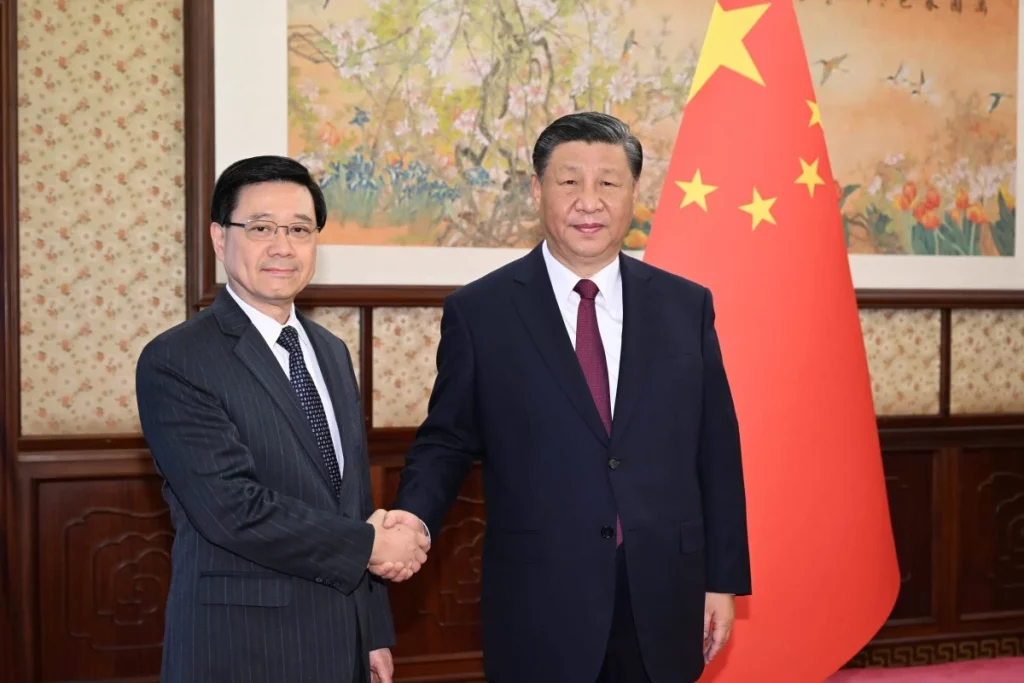It may not be a coincidence that Hong Kong’s Chief Executive John Lee met Chinese President Xi Jinping 18 December in Beijing when a landmark national security trial for pro-democracy media mogul of Hong Kong, 76-year-old Lai Chee-Ying, also known as Jimmy Lai, began in the territory. Jimmy Lai was the publisher and owner of the now banned Apple Daily and Next Digital. Predictably, Xi showered praise on Lee for running the Hong Kong government and “fully approved” of the job he has done during the past year. But Xi’s words that Lee has brought order “from chaos” and is paving the way for prosperity are obviously hyperboles. The ground reality is just the opposite. A majority of the population in Hong Kong is groaning under an oppressive regime and its growth trajectory is not as promising as is being made out.
On the other hand, the case of Lai typifies the state of affairs in Hong Kong where pro-democracy supporters and movements are ruthlessly being suppressed by the autocratic rule imposed by Xi. For, Lai stands accused of violating the draconian national security law Beijing clamped on Hong Kong in 2020. He founded the Apple Daily news outlet to champion freedom of speech and expression. But, it was shut down after a massive police raid and arrests of editors and journalists. This only followed the pattern adopted by all autocratic and tyrannical governments elsewhere in the world. He is charged with one count of sedition and three counts of violations of national security law. He has pleaded not guilty to all four allegations. The national security law is a highly controversial measure. It was imposed on Hong Kong to steamroll mass protests against the introduction of a Bill that would have allowed extraditions to the mainland. The Bill was eventually shelved. The security law runs counter to the arrangement made allowing Hong Kong to retain certain freedoms under China’s “one country, two systems” policy. The imposition was accompanied by a rigorous crackdown on dissent, including hundreds of arrests of pro-democracy activists and opposition legislators.
The Chinese authorities and their followers in Hong Kong stress that the stability of the city has been restored by the law, while critics say Hong Kong’s basic freedoms and various rights have been severely compromised. That such claims of the Chinese authorities are far from the truth becomes clear when one considers Xi’s wholesome praise of the conduct of Hong Kong’s district election held 10 December. He called the election a “remoulding” of the city’s district council system and claimed it was “smoothly completed.”
The election was a mockery of the people’s democratic rights since the rules were changed to ensure only “patriots”, as defined by Beijing, could take part as candidates. The overhaul disqualified all candidates from the pro-democracy camp, which had won over 80% of the total seats in 18 districts and took an absolute majority in all district councils in the 2019 election, when over 90% of all seats were elected by popular vote. The proportion of popularly elected seats was slashed to less than 20% this time. The turnout sank to a historic low of 27.54% from a record high of 71.23% in 2019.
It all reflects Hong Kong’s democracy-loving citizens’ aversion to Chinese repression and rejection of a process they believe is fake. Sadly, this phenomenon of suppressing people’s will by governments is becoming a common sight across the world. The demise of democracy seems to be near.
